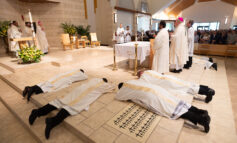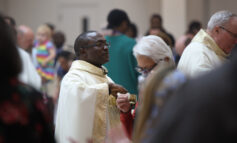By Father Thomas Esposito
Special to The Texas Catholic
Whenever people ask me how they can prepare themselves spiritually for Christmas, I invite them to read the lyrics of Christmas carols as prayers. Specifying which carols to employ is important; I am not aware of any mystical symbolism behind “Frosty the Snowman,” and I have long been convinced that “All I Want for Christmas is You” is fundamentally unredeemable on the first listen, let alone the ninetieth on the Christmas radio station’s saccharine and secular playlist. But many of the traditional Christian carols were first sung in a liturgical setting, and therefore were designed to be vocal prayers. That is certainly the case with “O Come O Come Emmanuel.”
The lyrics to this beloved carol date to approximately the 8th century, and they form an illustrious part of the Gregorian Chant heritage created and transmitted by the Catholic Church’s liturgical life. Before they were paired with the 15th century melody we recognize today, the stanzas of the song were an essential part of Vespers, the monastic evening prayer, for the last days of the Advent season. The stanzas that today form “O Come O Come Emmanuel” are the antiphons introducing the Magnificat, the canticle sung by Mary in Luke 1:46-55, for the seven days leading up to Christmas Eve, December 17-23. At your friendly neighborhood Cistercian Abbey, the monks refer to them as the “O Antiphons,” and as Advent advances, we eagerly await the chance to hear their beautiful melodies echoing off the limestone walls of our church (assuming, of course, that we avoid any massive choir fails).
The O Antiphons offer a quick summary of salvation history, a catechism lesson about God’s marvelous manner of preparing the world for the coming of His Son. The first words of each antiphon are titles bestowed on Jesus Christ, drawn from various books of the Old Testament in the Latin edition called the Vulgate:
O Sapientia – “Wisdom” (Isaiah 11:2)
O Adonai – “Lord” (Exodus 3:15)
O Radix Iesse – “Root of Jesse” (Isaiah 11:10)
O Clavis David – “Key of David” (Isaiah 22:22)
O Oriens – “Dayspring/Dawn of the East” (Zechariah 3:8; 6:12)
O Rex Gentium – “King of the Nations” (Jeremiah 10:7)
O Emmanuel – “Emmanuel” (Isaiah 7:14)
Each antiphon is sung using the same lovely chant tone, and all conclude with the plea Veni, “Come!” The exuberant creativity of the original author is on display in a subtle word play across the antiphons: when the first letters of the titles are read in reverse order, two Latin words are spelled out: Ero cras, literally, “I will be [here] tomorrow.” With this hidden hint about the Incarnation, the Lord Himself becomes the speaker of these antiphons while using our voices, promising that He is indeed coming soon to dwell in our midst!
These lyrics provide nourishing spiritual food that prepares us for the feast of Christmas day. The antiphon for December 21, O Oriens, may be taken as an example: “O Dayspring/Dawn of the East, splendor of eternal light and sun of justice: come, and enlighten those [of us] who are sitting in darkness and in the shadow of death.” The prophet Zechariah’s words originally instilled hope in the returning exiles from Babylon that they could rebuild their life and their Temple in Jerusalem. The Christian fulfillment of his prophetic words sees Christ, the resurrected Lord, as the rising sun from the east, illuminating minds and hearts darkened by sin and death with the light of eternal glory. That glory is reflected in the splendor of a star guiding the Magi to the infant light of the world in Bethlehem. With the help of these Christian psalms, we can thus welcome “the true light which enlightens everyone” (John 1:9) as He enters our world. And we can say, as individuals and as a grateful Church that dares to call itself the Body of Christ, “O house of Jacob, come – let us walk in the light of the Lord” (Isaiah 2:5).
Father Thomas Esposito, O.Cist., is a monk at the Cistercian Abbey of Our Lady of Dallas and teaches in the theology department at the University of Dallas.



